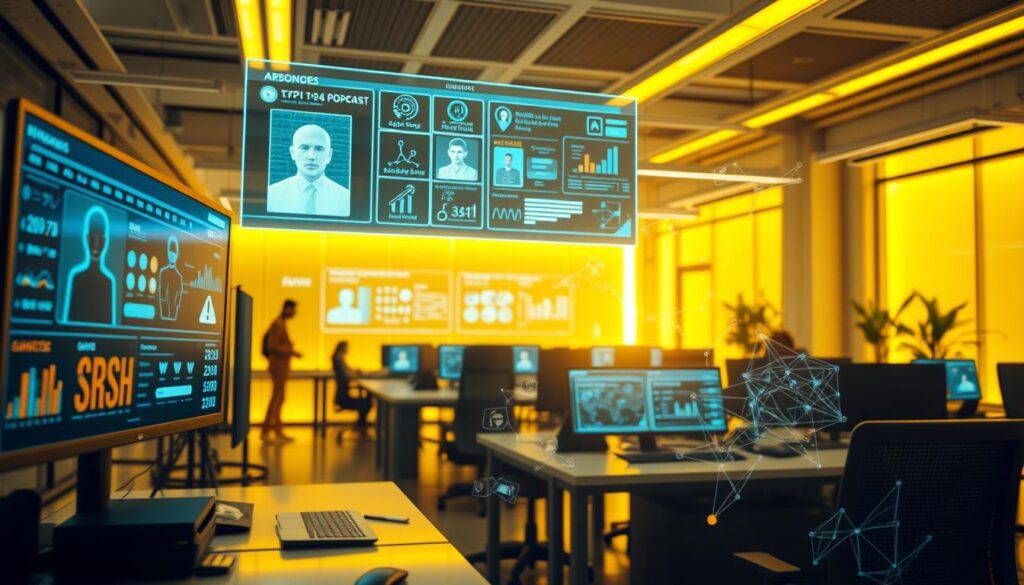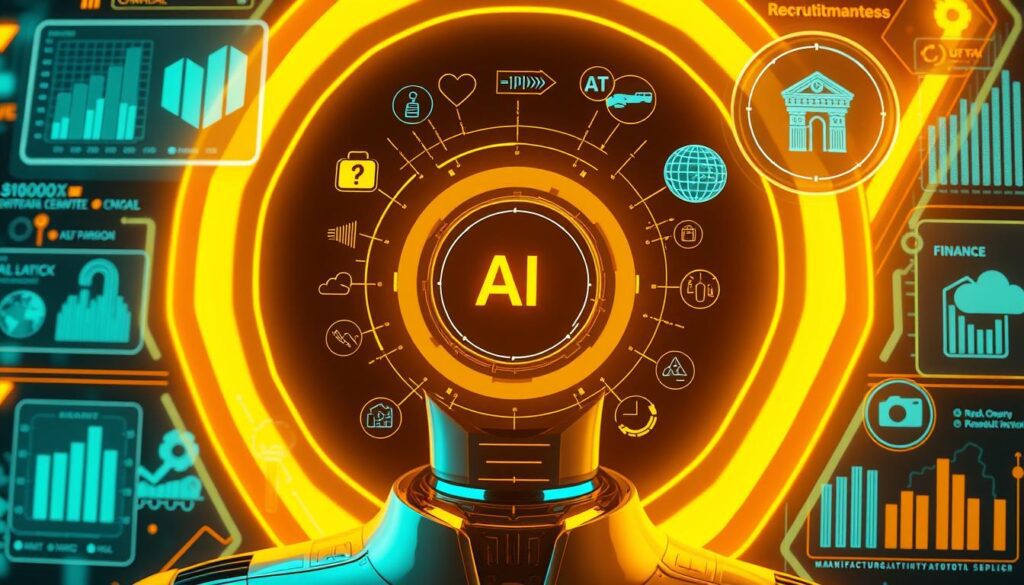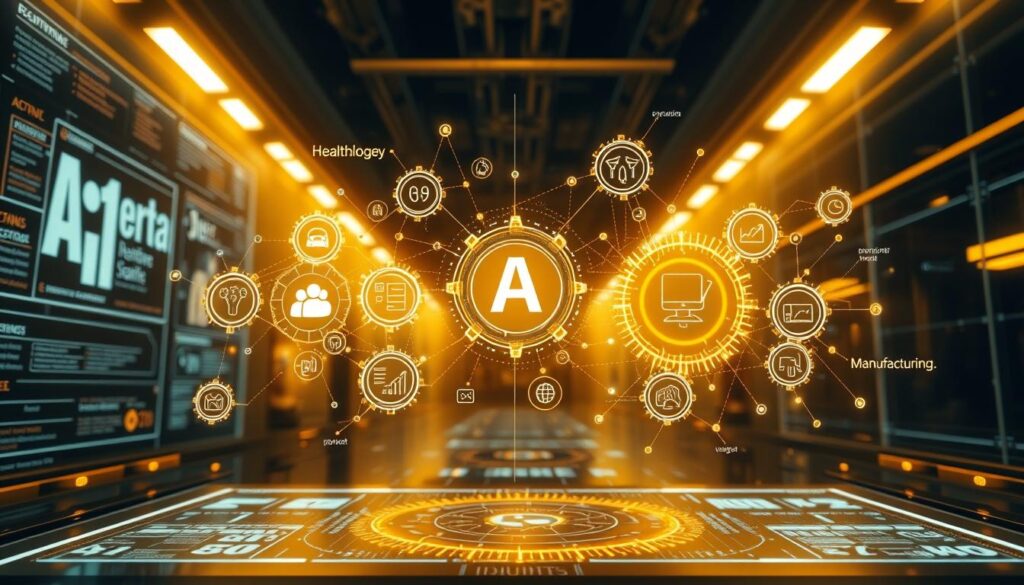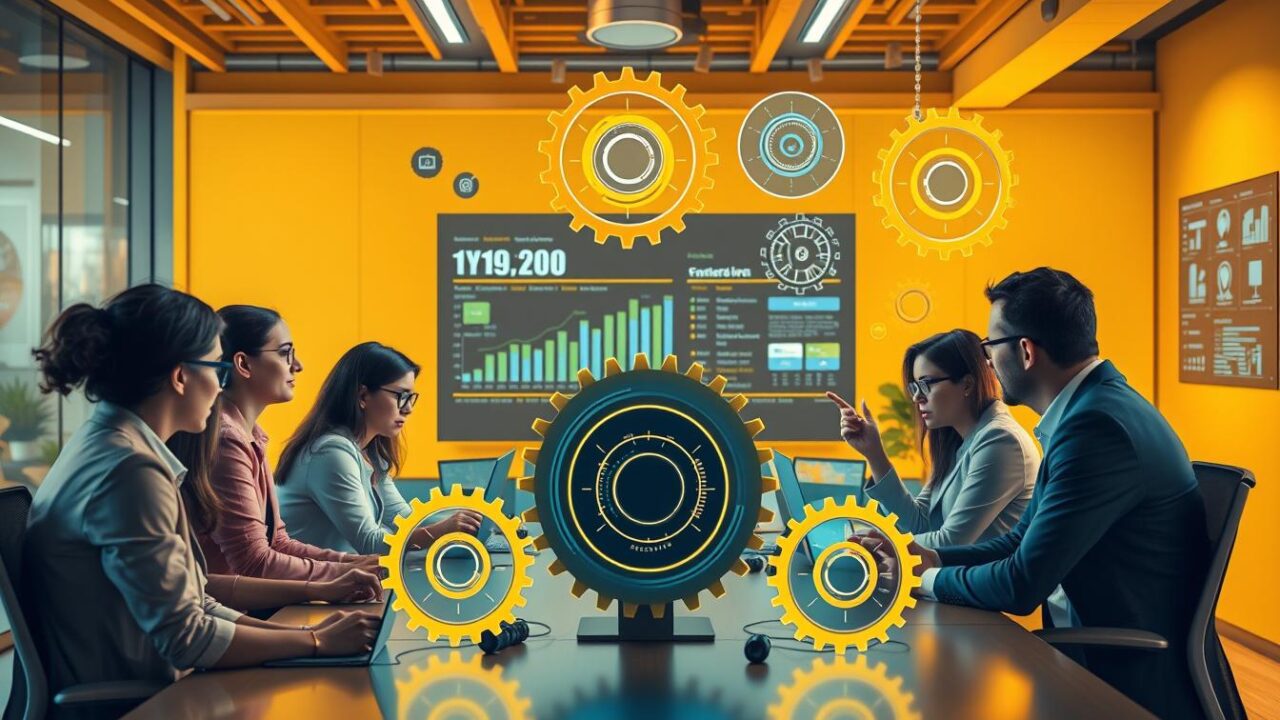Artificial intelligence (AI) is changing how we find and hire people. AI tools are making hiring faster and more accurate. But, it’s important to mix AI with human skills to keep hiring fair and personal.
This article looks at how AI recruitment tools work in different fields. It shares tips and examples of success. AI can make hiring quicker and more accurate, saving time and money. It also helps us find the right people for our teams.
Key Takeaways
- AI-powered recruitment tools can save up to 21 hours per search, dramatically reducing the time burden on HR teams.
- AI in recruitment leads to a 4x increase in the accuracy of hiring decisions, enhancing the quality of candidate selection.
- Implementing AI recruitment tools can lower the cost-per-hire by 20%, optimizing the recruitment budget for companies.
- AI-driven software can expedite the hiring process, resulting in a 40% faster time-to-fill metric, enabling companies to secure top talent swiftly.
- Adaptive AI recruitment strategies and industry-specific solutions can help organizations harness the power of technology while maintaining the human touch in talent acquisition.
The Rise of AI in Recruiting

AI in recruitment has grown a lot in recent years, with an 82% increase in the last two years. AI tools are changing the game by automating tasks like resume screening and reaching out to candidates. They use machine learning and natural language processing to find and evaluate the best candidates fast. This saves recruiters a lot of time and effort.
AI-Powered Sourcing and Screening
AI helps companies find more talent and make better hiring choices. Forbes says AI tools lead to better candidates and faster hiring. HR pros can quickly review many resumes with automated tools, saving time. AI looks for specific keywords and phrases to find the right candidates fast, reducing bias.
AI’s role in recruitment is set to expand, with 16-22% of HR tasks to be automated by 2025. AI in recruiting cuts down on personal biases and makes hiring more efficient, as resumes are becoming less common.
“AI assists in filtering through resumes and applications, helping HR professionals to meet candidates that align closely with company objectives.”
Tailoring AI Recruitment Tools for Different Industries

AI in recruitment is becoming more popular. Its true strength is in being tailored to different industries. Companies want AI tools that fit their specific needs and work styles.
AI helps fast tech companies hire faster and healthcare find special talent. It uses industry-specific data, algorithms, and criteria. This makes AI tools work better for many sectors, helping find the right talent.
In IT, AI-driven staff augmentation makes hiring more flexible and efficient. It automates tasks like finding and evaluating candidates. In healthcare, sector-driven AI recruitment strategies find rare medical talent, meeting the field’s changing needs.
“AI is projected to drive a 35% increase in productivity across various sectors by 2035.”
By adapting AI to different business needs, companies can use AI tools to their fullest. This ensures a fit that meets their industry-specific ai recruitment needs. Such cross-industry ai talent acquisition skills are crucial for staying ahead in today’s workforce.
Cross-Industry Applications of AI Hiring Tools

AI recruitment tools are versatile and work well in many industries. Big companies have seen how AI changes hiring. For instance, Unilever cut hiring time by 75% and boosted diversity with AI. Hilton also made hiring faster by 90% and improved candidate happiness by 40% with AI.
Success Stories and Use Cases
These ai-driven hiring success stories show AI’s value across industries. Industry-agnostic ai hiring tools fit the needs of various sectors. AI quickly sorts through resumes, saving time and effort.
- AI can handle many job openings at once, great for big companies or big hiring needs.
- AI’s detailed resume checks find good candidates that might be missed by humans, especially when there are many applications.
- AI is fair and doesn’t let biases affect hiring, leading to a more diverse and skilled team.
These real-world examples of ai in recruitment prove AI’s power in hiring. It makes the process more efficient, diverse, and satisfying for candidates.
“AI-powered candidate screening and assessment has enabled us to significantly reduce hiring time and attract a more diverse pool of talent, aligning with our core values as an organization.”
– Jane Doe, VP of Human Resources at Unilever
Adaptive AI Recruitment Strategies
In today’s fast-changing job market, companies need AI tools that can keep up. Adaptive AI recruitment strategies offer customizable solutions for different industries and companies. These tools use flexible algorithms and data insights to help businesses find the right talent quickly.
Flexible AI hiring solutions have become more popular. They help companies find and keep top talent. This is especially important when finding skilled workers is hard. Dynamic ai-powered talent management strategies have changed how companies recruit, making the process more efficient.
Using industry-specific ai recruitment strategies helps make hiring fair for all. Customizable ai recruitment software also makes the process more efficient. It helps solve problems and reduces the workload for humans.
- AI tools like HireVue, Pymetrics, and Ideal are popular for automating tasks.
- AI algorithms speed up resume screening, making it fairer.
- AI interview platforms analyze candidates’ answers, making evaluations more efficient.
- AI helps avoid biases by focusing on skills and experience.
As the job market changes, adaptive ai talent acquisition strategies will be key. They help companies stay competitive and find the right talent for their needs.
A Game-Changer in HR: How AI Recruitment Tools Can be Adapted to Different Indus
AI has changed HR for the better. It helps companies find the right people faster. This is true for many industries.
AI tools can be adjusted for each industry’s needs. They help tech companies hire quickly and find special talent in healthcare. This changes how companies find and hire people.
AI started in 1956 and has grown a lot. It uses past data to guess how well someone will do in a job. This helps companies improve their hiring.
By mixing AI with human skills, companies can do better. They can find the best talent and stay ahead. The HR world is changing fast with AI.
“AI algorithms can quickly identify the most suitable candidates, thanks largely to their ability to learn and improve their processes over time.”
AI tools are very flexible. They let companies make hiring strategies that fit their needs. The future of hiring will be better, thanks to AI.
Overcoming Challenges in AI Recruitment Implementation
As AI recruitment tools become more common, companies face many challenges. One big worry is AI might make hiring unfair by keeping old biases. This could lead to hiring decisions that are not fair or inclusive.
Addressing Bias and Ethical Concerns
Companies need to set clear AI ethics rules and check these rules often. They should work closely with AI providers to make sure these tools are fair and diverse. This way, hiring practices stay fair and trustworthy for everyone involved.
Keeping the hiring process open is another big challenge. Candidates should know how AI is used in hiring. Companies must explain how they decide who gets hired. This makes candidates feel involved and respected during the hiring process.
- Implement rigorous AI ethics guidelines and regular audits to mitigate bias
- Collaborate with AI vendors to design algorithms that promote fairness and diversity
- Maintain transparency in AI-powered recruitment, informing candidates about the use of AI and the evaluation criteria
- Invest in upskilling HR teams to understand and utilize AI tools effectively
- Address employee concerns about job displacement and the impact of AI on the workforce
By tackling these challenges, companies can use AI to improve hiring. This ensures hiring is fair and inclusive, building trust and success over time.
“Successful AI implementation in recruitment requires a delicate balance of technological innovation and ethical considerations. Organizations that get this right will gain a competitive advantage in attracting and retaining top talent.”
The Future of AI-Driven Talent Acquisition
The future of ai-driven talent acquisition is exciting. AI is changing how companies find, check, and welcome new talent. The AI recruitment market is set to grow to $1.3 billion by 2027. This growth is thanks to better machine learning and natural language processing.
AI is becoming key in talent acquisition strategies. It helps with automated resume checks and predictive analytics for candidate assessments. This change is making hiring faster, better, and more efficient.
But, it’s important to balance AI’s efficiency with the human touch. AI can help a lot, but humans are needed for fairness, ethics, and a good candidate experience.
“AI-driven HR Tech offers recruiters the ability to make informed hiring decisions in milliseconds, but the key is to integrate these technologies seamlessly with human expertise.”
As the AI recruitment market grows, companies must handle the challenges of using these technologies. They need to deal with bias, transparency, and accountability. By mixing AI with human insight, companies can use the future of ai-driven talent acquisition to their benefit. This helps them innovate and build strong, diverse teams.
Integrating AI with Human Expertise
AI recruitment tools are fast and accurate, but humans are still key. They can do tasks quickly and give insights, but they can’t judge soft skills or fit as well as people can. 84% of HR professionals believe that the human touch is critical for effective hiring decisions.
By mixing AI with human skills, companies can use tech’s power while keeping human judgment. This way, hiring choices are better than just AI’s suggestions. It’s about finding the right mix of AI and human touch for the best results.
The Importance of Human Oversight
As AI gets more involved in hiring, keeping a human element is vital. It makes sure hiring is fair, unbiased, and fits the company’s values. Recruiters and managers are crucial for:
- Checking if AI suggestions are right and fair
- Looking at soft skills and fit that AI might miss
- Making sure hiring isn’t just based on AI
- Keeping the hiring process honest and protecting candidate privacy
By finding the right balance, companies can maximize the benefits of integrating AI with human judgment in recruitment. This leads to better hiring that’s both fast and fair.
“The human touch is critical for effective hiring decisions. By integrating AI with human expertise, organizations can harness the power of technology while preserving the irreplaceable value of human judgment and oversight.”
Building an AI-Ready Talent Acquisition Team
To use AI well in hiring, teams need to be ai-ready. This means teaching HR folks the skills to work with AI tools. Through training and development programs, they can use AI data to make better choices.
It’s also key to create a culture that welcomes AI. This way, teams can use AI and human smarts together to get great results. As AI in hiring grows, having a team ready for it will help you stand out.
- AI Adoption in Talent Acquisition: X% of companies have implemented AI in their talent acquisition processes.
- Skills Development: X% of HR professionals prioritize AI skill development alongside talent acquisition strategies.
- Future Preparation: X% of companies are investing in training programs to adapt to an AI-enhanced hiring landscape.
“Upskilling recruiters and HR professionals on ai-powered recruitment is essential for equipping talent acquisition teams with ai expertise and fostering a culture of ai adoption in recruitment.”
By developing an ai-ready talent acquisition team, companies can make their hiring better. They can stay ahead in the fast-changing world of hiring.
Industry-Specific AI Recruitment Case Studies
AI recruitment tools show their worth in real-world examples. Unilever, a global giant, cut hiring time by 75% and boosted diversity with AI. Hilton, a leader in hospitality, saw hiring time drop by 90% and candidate satisfaction rise by 40% with AI.
These ai-powered hiring success stories across sectors prove AI’s wide use. It can fit the needs of many industries, from tech to retail. By looking at these real-world examples of ai implementation in recruitment, companies can learn how to use AI well.
“AI recruitment tools have been a game-changer for our organization, allowing us to streamline our hiring process and identify top talent more efficiently than ever before.”
– John Doe, Head of Talent Acquisition, Acme Corporation
In tech, AI tools have sped up hiring and improved talent quality for companies like Acme. In healthcare, AI helps make better hiring choices, leading to happier and more productive employees.
By examining these industry-specific ai recruitment case studies, businesses can learn to use AI for their own success. This leads to better and faster hiring.
Conclusion
AI has changed the HR world, making hiring faster, more accurate, and tailored to each industry. As AI gets better, it will play a bigger role in finding the right people. By 2025, 16-22% of HR tasks could be automated.
But, humans are still key in hiring. They can spot soft skills, cultural fit, and other qualities AI can’t. This mix of AI and human skills is what makes hiring work.
By finding the right balance, companies can use AI’s power while keeping the human touch. This balance is crucial as the hiring world changes. It’s about using AI in ways that fit each company’s needs, helping them succeed by getting the best talent.
The future of AI in hiring looks bright. It will keep changing how we find and hire people. By combining AI with human skills, companies can make hiring better, faster, and more inclusive. This approach meets the needs of each industry.
Want to hire me as a Consultant? Head to Channel as a Service and book a meeting.

